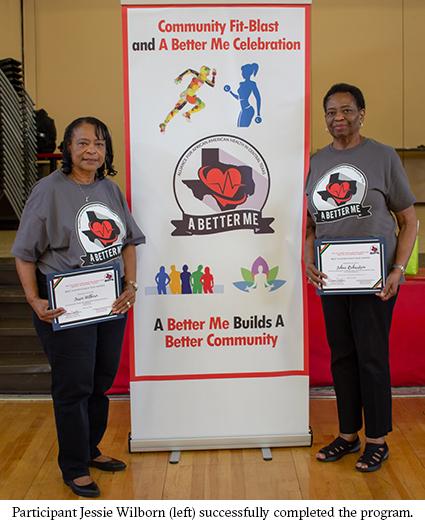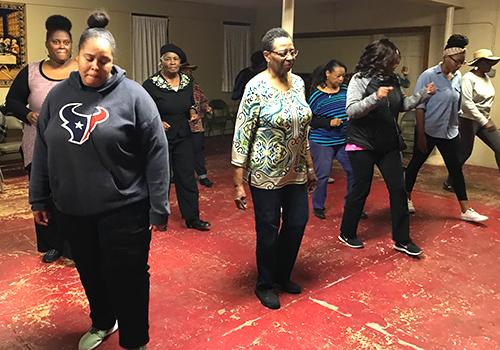
The ad Jessie Wilborn saw at church sounded like something that might finally help her get her diabetes, high cholesterol and high blood pressure under control.
“The program seemed simple enough, and I could see it offered a lot of support,” Jessie, a 70-year-old African American from Austin, said about A Better Me, a program designed to help participants set fitness goals and achieve a healthier lifestyle.
In addition to diabetes, high cholesterol and high blood pressure, Jessie suffered from acid reflux. She was ready to make a change and joined the program in December 2016. After more than a year, she is thrilled with her results.
“I’ve cut all my medications by half and I’m sleeping better,” she said. “And only once in a blue moon do I have reflux.”
Chronic diseases and conditions such as heart disease, stroke, cancer, type 2 diabetes, obesity, and arthritis are among the most common, costly, and preventable of all health problems facing the nation today. These disabling conditions have profound and pervasive effects on the lives of millions of individuals. Seven out of 10 deaths each year result from chronic disease and almost one out of two adults has at least one chronic illness. In the United States, chronic conditions and the health risk behaviors that cause them account for most health care costs.
A recent study in the Journal of Clinical Hypertension described how African- American, Asian, American Indian and Pacific Islander individuals have an increased risk for hypertension compared with those who are white or Hispanic, regardless of weight, socio-economic status or education level. This holds true for residents of Travis County.

But the news isn’t all bad. Change can be made; disease can be managed as Jessie discovered. Through a collaboration between the Alliance for African American Health in Central Texas (AAAHCT) and the UT Austin School of Nursing, many African-American individuals are finding they are able to make healthier lifestyle choices.
The partnership began when AAAHCT Executive Director Marva Overton participated in a community-based participatory research class taught by Dr. Miyong Kim and Dr. Melissa Smith at the School of Nursing in spring 2015. The class brought together leaders of community organizations and graduate students to learn and practice how to design, implement, evaluate and disseminate community-based research through a true collaborative methodology.
As a result, Dr. Kim and her team in the School of Nursing’s Center for Health Equity Research (HER) and AAAHCT collaborated on a City of Austin grant to bring attention to a pressing health care crisis that contributes to excessive premature deaths and reduced quality of life for African Americans in Travis County and to develop community-driven solutions.
The collaboration resulted in a grant, with a five-year extension option, of approximately $112,000 annually. It was one of several first-ever health equity grants issued by the City of Austin to fund efforts that address health disparities in local underserved populations.
Using a health coach model, A Better Me enrolls participants who then identify specific health goals they want to achieve and provides individualized and group peer coaching, along with community resources to assist them. Members of the School of Nursing and AAAHCT meet on a regular basis to review and refine the program design, implementation and evaluation.
School of Nursing staff and students provide additional training for coaches in motivational interviewing and health behavior change strategies and take quarterly biometric measurements of participants, height, weight, blood pressure and blood sugar to evaluate the effectiveness of the program.
Jessie and her coach Johnie Richardson started off meeting once a month, but Johnie invited her to get in touch by email or phone whenever she had a question or needed some encouragement.
“We talked on the phone weekly, and I really appreciated her support,” Jessie said. “She provided resources and helped me get started on an exercise program. It used to be that when I felt stressed, I would eat. But now I go to the rec center and walk for 20 minutes instead.”
Jessie also enjoyed the many and varied presentations during the monthly group meetings, such as a healthy eating session led by Joan Roberts-Scott, a former Weight Watchers instructor. She stressed the importance of recognizing triggers that can cause some people to overeat, reading food labels, and understanding portion sizes. She also facilitated an interactive session during which participants broke into groups and developed meal plans. Another popular presentation was a healthy cooking demonstration by Erin Rivers, a local caterer who shared her challenges and success with weight loss and making healthy food choices.
Another change Jessie learned to make was how she bought groceries. “You should see my pantry now! It’s stocked completely differently,” Jessie said. “I eat healthy foods and have learned better coping strategies.”

But it’s not all about food. Other instructors get participants up on their feet for line dancing and zumba, a popular dance workout.
“Group support, increased accountability and resources help participants to reach their identified goals,” Overton said. “The success of A Better Me is measured not only by behavioral and biometric outcomes, but also by the ability to remove the barriers that keep people from getting and staying well.”
Researchers and employees at the Center for HER are excited about the program’s success and have come alongside other community organizations to help them experience similar results.
“Our goal is to create a model national center that will develop, test and disseminate these kind of innovative self-management solutions to improve the health outcomes of people with chronic conditions,” said Dr. Kim, professor at the School of Nursing and director of the center. “Today more than ever, there is an urgent need for the integration of nursing science with other relevant disciplines in the development of self-management science. Such trans-disciplinary collaborative research will not only yield cutting-edge science, it will closely fit the actual clinical environment of health care.”
It wasn’t always easy, but taking charge and making changes worked for Jessie, and she’s convinced it will work for others.
“I would encourage anyone concerned about their health to get involved in this kind of program and make healthier lifestyle choices,” Jessie said. “But don’t expect to change overnight! It takes time, commitment and support — but it’s worth it.”